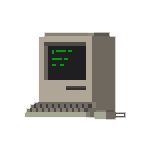throwing away stuff = decisiveness
After you accumulate enough stuff in your home, you start to forget things even exist.
You can walk past them every single day and their image will even strike your optic nerve, but your consciousness doesn't even register them anymore. Or maybe you kinda notice them and they annoy you for a split second, but you just don't wanna deal with it right now. Yet they still take a toll on you, just distracting you or making everything feel more cluttered and complicated. You want your home to be a place for calm but all this stuff creates mental noise that makes that impossible.
So I just realized today I had nowhere to put a book on my desk.
Then I started cleaning.
I looked over and began with some crap littering my side table. These things REALLY pissed me off: old papers, pamphlets, old business cards from people I don't even like, ticket stubs, mostly-empty toiletry items, a battery that was probably maybe dead. I threw them in the trash bag.
As I did this, I started noticing more and more things in my room. Random stuffed animals I had won at carnivals. Stupid BOXES for electronics with unread manuals in them ... and i'm pretty sure i had lost that PowerShot camera three years ago. Why the fuck is the box still here?
The rage built up. This was no longer more of the usual: just tidying up, pushing shit around. This became about actually solving the root cause.
The mission began to snowball. I started throwing away crap, you know, the crap you just hadn't yet decided was worthless yet: stuff you held onto just because you didn't feel ready to junk them or felt bad tossing them or postponed dealing with for some reason. Old t-shirts I don't really wear anymore (clothes are really hard to toss out, for some reason). Then crap from ex-girlfriends. More random shoe boxes, bags. A torn undershirt (???). An old messenger bag from high school that i don't use anymore, literally covered in dust; it had an anti-itch spray for mosquito bites in the front pocket. Inside a big box for "tech shit" was a stack of CD-Rs I kept around cause, well, just in case! When the fuck do I ever burn CDs? Junk. Random cables. A power charger for an old flip phone. Junk. A broken mechanical pencil; why the fuck did i keep this around?
Then by chance I looked under my bed and discovered not only a fair amount of dust but also three pairs of shoes I had completely forgotten that I owned. One pair was barely used because I found they were extremely uncomfortable and I couldn't return them so I had decided to stash them down there. Just seeing them again pissed me off. Fucking stupid. Junk. This exemplifies some of the worst cases of material cruft: bad purchases that you regret but can't muster the courage or resolve to discard. Just chuck 'em out. The guilt goes with them.
More shopping bags tucked in the corner. Fuck them.
The more crap I threw the more I started SEEING the crap in plain sight all around me. I could finally notice things, like some dark veil had been lifted from my eyes. Armed with this new perspective, I ventured into the kitchen.
Cans of shitty food I bought for Hurricane Irene / Thermonuclear War / Whatever. Junk. An old bag of tortilla chips that must've been two months old. Junk. A random bottle of whiskey with literally a tablespoonful left. I shrugged and drank it. The bottle went in the junk.
Some fucking 1/4-full bottle of water sitting in the corner. RAARKJALFKJELFKJAFARGHHH.
At this point I was ... well you get the idea. I was just ready to destroy shit.
I went into the living room.
Old magazines. A newspaper from a month ago. Some CD I forgot to put back in its case but I had already ripped it to my library so the physical disk just wastes space so who fucking cares. Junk. A brochure promising exciting adventures mountain biking (which I still haven't done yet so I kept the thing to remind me someday, possibly never). Junk.
A dirty paintball mask I bought for $10 on the one and only day I've ever gone paintballing, discovered somehow fallen behind the TV. There are several things wrong with this but whatever. Junk.
So, moral of the story ...
The real reason why I've accumulated all this crap isn't because I'm some kind of deranged pack-rat, like those old ladies who keep newspapers stacked up to the ceiling or wackos that keep old used diapers in the closet. I was just indecisive. Whenever I felt guilty about something or postponed something or didn't want to make a real decision about something, I just stashed it.
The next time you see something in your room, ask yourself: do I actually use this? Am I seriously going to need it? No? Fucking toss it now.


